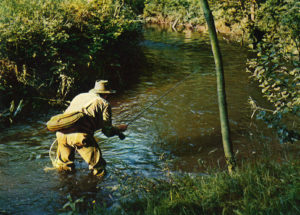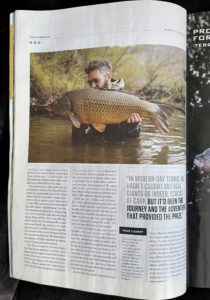
The only fully imagined fishing episode in Ruin is at the English carp lake. It is where Aldous Huxley’s stunningly mordant 1939 novel After Many a Summer Dies the Swan is partly set. The small lake has held long-lived carp since it was dug by monks in the Middle Ages.
I won’t give away the story here, but my research of modern carp fishing in Britain and Europe uncovered surprises as vivid as a far-fetched fantasy.
Carp fishing historically and now is a British male working-class sport. Its ethos and technicalities are at polar opposite of middle-class trout fly fishing. To my surprise I saw proper carp fishing in lakes involves a closed world of complexity comparable to the closed world of proper trout fly fishing in streams.

The photo here is the cover of one of multiple publications carp fishers contribute to and learn from, in addition to books. The man is kissing the fat fish before returning it to its water. Carp fishermen often do this. For the carp it can become an often-repeated experience. Distinctively marked individual fish acquire marquee names like movie stars: Old George, Raggedy Butt, so forth. They grow to sixty pounds as vegetarians, and can live as many years. They are in no danger of extinction since none is ever killed, young fish are stocked, and access to their lakes is controlled by paid permit limits.
Ruin’s depiction of the fisher’s gear is very accurate. While static as to their own movement once in place, the mental strategizing of expert carpers has long been both intense and rapidly evolving in content over past decades. For centuries carp (which are tasty) were caught on bread and potatoes sometimes concocted with honey and worms. But in the twenty-first century carp baiting has jumped to new technological complexity. For carp fishers this means modern chemistry offers a wealth of new bait compounds. And judging from the sport’s articulate literature, a wealth of opportunity for both experiment and dispute sometimes fueled by alcohol in lakeside vigils.
“Fish got a brain size of a pea,” Robert cautions Frank in Ruin. But among carp fishers respect for the subtle behavior of grazing fish, hypersensitive to smell yet highly unpredictable of response, makes them in effect highly intelligent adversaries worthy of respect. Thus magazines and books are filled with photos of men smooching bulbously overweight tough old carp of the dozen species.
I found this sport intriguigingly warm-hearted. After all trout fishers should not really touch their delicate catches at all much less smooch them.
Today over fifty businesses globally sell compounds and materials, often patented and jealously enforced, for use in baiting. There are fisher proponents and fisher opponents of dozens of permutations of bait material and carp mentality cultivation. One can argue for or against a preparatory bath of “bait” in illogical spicy chorizo sauce. Or in Britain preposterous pineapple juice. Or one of the dozens of commercial baths for one of the hundreds of commercial baits. One can argue over how far from the hook bait one should slingshot a “hospitality” of chum bait of the same nature, of the same or different size, spherical or chopped. Argue for a “pop up” keeping the hook bait an inch or so above the lake bottom, or for sinking the hook bait naturally among the arrayed hospitality.
The complexity is fascinating. But still there are those who choose sometime to revert to simplicity. In a contrarian strategy, they throw out a hooked parboiled potato with a clump of worms. They tend to be loners.
Ruin’s last passage is its people in their concluding moment. In writing I realized what I was portraying as to their carp adventure resonated Frank’s whole preceding quest to become a trout fisherman. That scene’s complicated technical carp pursuit balanced with Frank’s past as a noble savage simple trout fisherman: Frank through it all had found that there is deep good spirit in outdoor sport. And we readers through it all have seen that comparison of sophisticated complexity or instinctive simplicity is really detail. Not essence.
